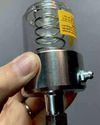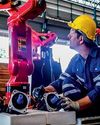
They recognize subtleties, discern unique features and examine characteristic details. This could be a glass of Spanish red, a seat on a flight to London or a test drive of a Tesla Roadster. Using our senses, we register facts and find nuances that collectively help us arrive at opinions and conclusions on quality, functionality, attractiveness, comfort and value. Perception is reality.
Computers with deep-learning algorithms fed by innumerable sensors are used to collect and process data. Notwithstanding, they are no match for our senses and our brain. Artificial intelligence is better at augmenting our intelligence but not replacing the cognitive ability of our brain flanked by human senses. If you think I’m wrong, try having a conversation about your favorite sports team with Alexa or Siri. Or ask a simple question like, “Can a fish be taught to ride a bicycle?”
This high level of human perceptiveness is applied to our work environment and maintenance culture. Let me give you an example. In criminology, there is a concept known as the broken windows theory. It states that “visible signs of crime, antisocial behavior and civil disorder, such as broken windows in abandoned buildings create an urban environment that fosters further crime and disorder, including serious crimes.” In other words, the perception of a neighborhood in decay bolsters criminal behavior.
Denne historien er fra May- June 2023-utgaven av MACHINERY LUBRICATION INDIA.
Start din 7-dagers gratis prøveperiode på Magzter GOLD for å få tilgang til tusenvis av utvalgte premiumhistorier og 9000+ magasiner og aviser.
Allerede abonnent ? Logg på
Denne historien er fra May- June 2023-utgaven av MACHINERY LUBRICATION INDIA.
Start din 7-dagers gratis prøveperiode på Magzter GOLD for å få tilgang til tusenvis av utvalgte premiumhistorier og 9000+ magasiner og aviser.
Allerede abonnent? Logg på

The Secrets For Implementing A Clean lubricant Program
If you could find an investment that guaranteed a return 40 times greater than your initial investment, you probably wouldn't pass it up.

MAINTAIN? REPAIR? REPLACE?
When considering the life of any asset, the question arises: what types of interventions should be planned to keep it operating or to restore operation in the event of its failure?

Engineering Reports Should Be Like Bad Movies
I'm frequently asked to review engineering reports, and I'm continually baffled by how many engineers want to take their readers on a journey instead of getting to the point.

WHY SCHEDULED OIL CHANGES AREN'T ENOUGH TO MITIGATE LUBRICANT CONTAMINATION
There are few problems more insidious or damaging to large industrial machinery than contaminated lubricant.

LUBRICATION CONTAMINATION PREVENTION
How many articles have you read, or seminars listened to, that tout the value of contamination control? If you are like me, they number in the hundreds—if not thousands. One thing about these articles and seminars that bothers me is the word “control”.

LUBRICANT CONTAMINATION PREVENTION AND MITIGATION: A Guide For Maintenance Professionals
Lubricants are essential for the smooth and efficient operation of many types of machinery, from engines and turbines to gears and bearings.

TASK-BASED TRAINING | INSPECTING A SINGLE-POINT LUBRICATOR
A single-point lubricator is a device engineered to attach to a single unit to regularly and automatically deliver a small amount of clean grease or lubricating oil to a specific area.

TOP LEADERSHIP FOCUSES FOR IMPROVED RELIABILITY AND COST REDUCTION
Here’s a scenario that may sound eerily familiar – you have a new reliability initiative.

4 KEY ELEMENTS FOR INTERPRETING AN OIL ANALYSIS REPORT
Years ago, a customer came into my office, visibly upset. He had just received his second oil analysis report for one of his Caterpillar gas engines.

ASTM ENHANCEMENTS TO MICROSCOPIC PARTICLE IDENTIFICATION AND DOCUMENTATION
In 1982, Daniel Anderson published his influential book, \"Wear Particle Atlas\", which describes, sizes, and classifies particles found in oil.